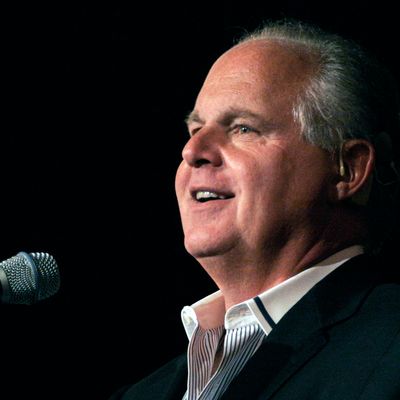
Rush Limbaugh had one of his daytime fever dreams today, during which he mused that the Obama administration lacks the requisite fervor to fight the Ebola virus because of slavery. This is one of Limbaugh’s more intricate theories, and perhaps requires explanation. Limbaugh began his soliloquy by quoting an expert who urged Americans not to abandon Liberians because of America’s historical relationship with that country. (It was founded as a colony for freed slaves.) Limbaugh was struck by this view, which he held up as representative of liberal opinion. He then postulated that a sympathy for Liberians (“this is ultimately traced back to us because of our slavery”) naturally translates to a lack of sympathy for Americans. “There are some people who think we kind of deserve a little bit of this …” Limbaugh explained. “The danger we have now is that we elected people in positions of power and authority who think this or think like this in terms of this country being responsible, this country being to blame for things.”
It is possibly unsurprising that Limbaugh’s brain, or brain stem, would leap from Ebola to Liberia to slavery, since slavery is Americans’ primary association with Liberia. But the unusual thing about Limbaugh is that a great many things remind him of slavery.
Limbaugh believes Barack Obama’s economic plan was a form of reparations, and believes the same about health-care reform. He further believes that Obama disagrees with Limbaugh’s interpretation of the Constitution because the Constitution permitted slavery. Limbaugh has likewise argued that 12 Years a Slave won the Academy Award for Best Picture because it was about slavery — “It was going to win. It had the magic word in the title: slave.”

Limbaugh’s racialism does not especially distinguish him among conservatives. He does perhaps hold unusually strong zero-sum beliefs about racial politics, which is why he sees even such maladies as unemployment and contagious diseases, which are obviously bad for everybody, as left-wing plots to level the racial playing field.
The quality that sets Limbaugh’s racialism apart from that of most conservatives is its historical sweep. The typical conservative treatment of race ignores the past. Conservatives start the racial clock at 1964. This is one of the most important distinctions between liberal and conservative American thinking on race: The former regards slavery and Jim Crow as essential and still-relevant precursors to contemporary race relations. Conservatives treat the civil rights movement as having wiped out the racial debt owed to black America. The past is too distant for them.
But Limbaugh is obsessed with the distant past. He does not want to forget about slavery and its legacy — he cannot stop talking about them. Limbaugh believes that, rather than a blight on white America, it should be seen, in a world-historical context, as a point in its favor:
If any race of people should not have guilt about slavery, it’s Caucasians. The white race has probably had fewer slaves and for a briefer period of time than any other in the history of the world. …
But despite all that, no other race has ever fought a war for the purpose of ending slavery, which we did. Nearly 600,000 people killed in the Civil War. It’s preposterous that Caucasians are blamed for slavery when they’ve done more to end it than any other race, and within the bounds of the Constitution to boot. And yet white guilt is still one of the dominating factors in American politics. It’s exploited, it’s played upon, it is promoted, used, and it’s unnecessary.
The grotesque unfairness, that white Americans are blamed for slavery when they should be credited for their relative lack of slavery, galls Limbaugh continuously. The unusual thing is that extended consideration of slavery and its connection with modern politics normally pushes one toward the political left. Limbaugh’s reaction is just the opposite. He cannot stop thinking about white America’s plunder and mistreatment of African-Americans, and his reaction to this sentiment is an almost violent revulsion against white guilt.






























